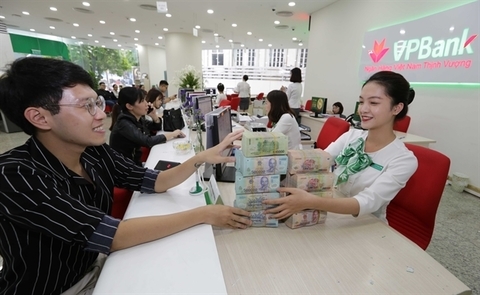 |
The Viet Nam Prosperity Commercial Bank (VPBank) is collecting shareholders’ opinions on its plan to issue foreign currency bonds with a total value of up to US$1.12 billion. The majority of bonds would likely be issued under the Euro Medium Term Note Programme with a maximum value of $1 billion and terms of three to five years.
The bonds would be issued in several installments this year or next year to investors outside the US and would be listed on Singapore’s stock exchange. The bank said the purpose of the issuance was to increase its scale of capital.
It was also planning to issue green bonds worth $120 million in a private placement to some investors. If the deal goes through, it would be the largest issuance of its kind so far in Viet Nam.
Tien Phong Bank (TPBank) is also seeking shareholders’ approval for the issuance of $200 million in foreign currency bonds this year. The time for collecting opinions is between June 28 and July 12. Last year, the Ho Chi Minh Development Commercial Bank (HDBank) also planned to issue $300 million in convertible bonds with a fixed interest rate for five years for less than 100 investors in 2019.
Issuing international bonds is new to many Vietnamese banks as they are used to seeking foreign capital through trade finance or trade credit agreements with major foreign financial institutions. Last year, LienVietPostBank received a $50 million loan from JPMorgan Chase Bank’s Singapore branch.
Sai Gon-Ha Noi Bank (SHB) also obtained loans from two Russian banks including a $20 million dollar loan on a five-year term from the International Investment Bank and a 20 million euro loan from the International Bank for Economic Cooperation.
The International Finance Corporation (IFC) has also provided long-term loans to local banks including TPBank, Ocean Bank and An Binh Bank (ABBank).
Economist Vo Tri Thanh said banks were under pressure to hike capital to meet the State Bank of Viet Nam (SBV)’s CAR regulations, especially under Basel II standards. Selecting which type of mobilisation depended on how the banks would optimise costs.
“The credit ratings of both Viet Nam and local banks are getting better which reduce the risk premiums for bond issuances,” Thanh told Viet Nam News, adding that local currency bonds faced higher interest rates.
In April, S&P Global Ratings raised Viet Nam’s long-term sovereign credit rating to BB from BB–. In May, Fitch Ratings revised Viet Nam’s long-term foreign-currency issuer default rating (IDR) upward at ‘BB’ with a positive outlook. According to the global ratings agencies, the revision of Viet Nam’s outlook to positive from stable reflected an improving track record of economic management, evidenced in high growth and stable inflation.
“Issuing international bonds is also one way through which banks are connecting with potential strategic investors,” Thanh said.
However, according to financial expert Nguyen Tri Hieu, banks may benefit from lower interest rates in the international market, but they had to bear the risk of exchange rate (forex) fluctuations.
"When issuing bonds, the exchange rate is relatively low, but when it comes to maturity, the exchange rate may increase and banks may have to buy US dollars at a higher price to repay the debt. In the context of forex volatility which tends to increase, international bond issuances will face significant risks," Hieu was quoted on economic and financial website cafef.vn as saying.
In addition, only strong banks with good reputation and credit rating assessed by international rating agencies could sell bonds overseas, he added.
Since the beginning of the year, the exchange rate has been fluctuating. The central bank is facing pressure from unpredictable developments in the US-China trade war and US-Iran tensions, as well as geopolitical instability.
However, the SBV has intervened in the foreign exchange market to stabilize the VND/USD exchange rate. According to World Bank data, the Vietnamese dong weakened by 0.7 per cent against the US dollar between March 1 and May 8.
Vietnamese banks have been struggling to raise long-term capital in recent years with the central bank tightening the ratio of short-term capital for medium- and long-term loans. According to SBV regulations, only 40 per cent of a bank’s short-term capital can now be used for long-term lending, down from the previous rate of 45 per cent.
While mobilisation from depositors is facing difficulties, many banks have been looking to issue bonds in the domestic market with higher yields.
Last month, Vietcombank and Asia Commercial Joint Stock Bank issued local currency bonds worth a combined VND15 trillion ($643.8 million) with yields between 6.3 per cent and 7 per cent per year.
At the end of May, Vietinbank also got the SBV’s nod to issue bonds with a total face value of VND10 trillion this year. — VNS

Vietnam Report unveils top commercial banks
Vietnam Report on Tuesday announced the 'Top 10 Vietnamese Commercial Banks in 2019' based on their financial capacity, reputation and customer satisfaction.

Vietcombank licensed to open office in New York
The New York State Department of Financial Services has granted operating license to the Commercial Bank for Foreign Trade of Vietnam (Vietcombank) to open a representative office in New York.

Vietnam’s banks change from magnetic cards to chip cards
The change in technology used for domestic payment cards is expected to give a push to non-cash payments in Vietnam.
 Vietnamese banks are seeking to raise capital in international bond markets as they face growing pressure to hike capital to satisfy the central bank's regulations on minimum capital requirements and Basel II standards by early next year.
Vietnamese banks are seeking to raise capital in international bond markets as they face growing pressure to hike capital to satisfy the central bank's regulations on minimum capital requirements and Basel II standards by early next year.